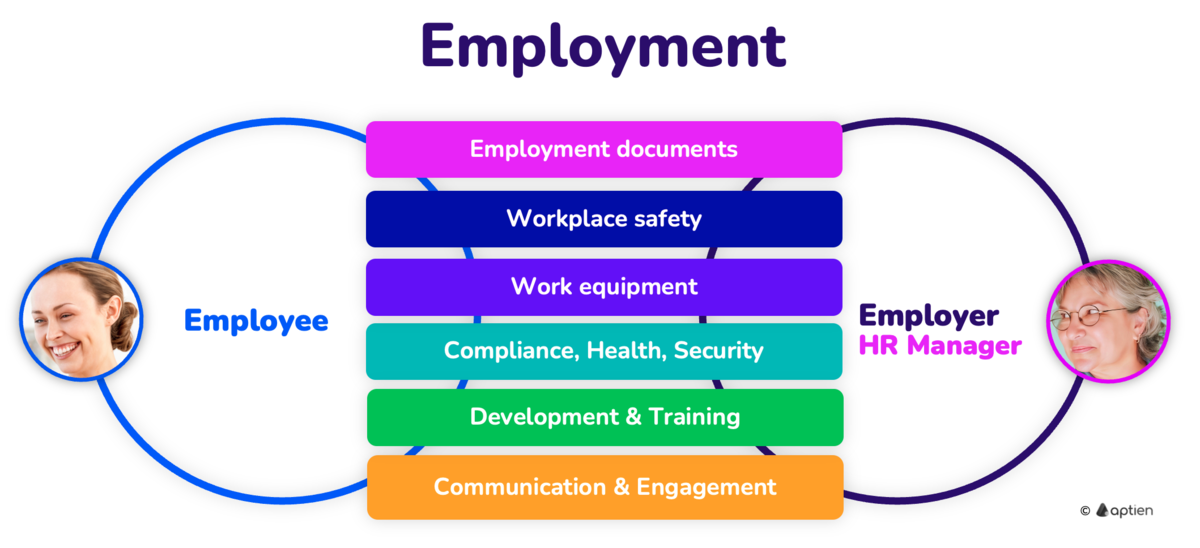Employment is a relationship between a company as employer and a person as an employee usually based on a contract. Employment creates a relationship between an employee and an employer. The employment contract regulates the conduct of both parties and it is important that both the employer and the employee fulfill their obligations.
Employer's Basic Duties and Responsibilities During Employment
- Provide a safe and healthy work environment – ensure workplace safety and employee health protection.
- Provide employees access to information about their rights and obligations – for example, in the form of work rules or company policies.
- Pay wages/agreed remuneration on time and in full – comply with agreed remuneration terms.
- Respect working hours and breaks – ensure compliance with legal working time limits.
- Provide work equipment, tools and conditions for performing work – provide the necessary equipment and support.
- Ensure equal treatment and protection against discrimination – respect the labor rights of employees.
- Provide employee training and development – enable professional growth and skills enhancement.
- Fulfill legal and contractual obligations in the area of taxes and insurance – pay taxes and insurance premiums.
- Maintain the confidentiality of employees' personal data – protect privacy and personal information.
- Resolve labor disputes fairly and transparently – adhere to ethical and legal standards.
- Inform employees of changes affecting their working conditions – for example, changes in the employment contract, organizational changes.
- Provide employees with statutory benefits – such as vacation, sick leave, maternity/paternity leave, pension contributions (where applicable).
- Ensure fair evaluation of employee performance – provide feedback and address compensation based on merit.
- Comply with the rules of termination of employment – ensure fair and lawful termination of the contract.
Basic Duties and Responsibilities of an Employee During Employment
- Comply with safety and health regulations – work safely and prevent risks.
- Comply with internal regulations and company policies – such as dress code, use of company property, code of ethics.
- Perform work properly and conscientiously – follow work procedures and quality standards, do not misuse working hours for private activities.
- Respect working hours and attendance – be present according to the agreed schedule.
- Use work tools responsibly and protect the employer's property – prevent damage.
- Behave professionally and with respect towards colleagues and superiors – adhere to the code of ethics.
- Participate in training and improve your qualifications – learn and develop your skills.
- Properly pay taxes and social security contributions (if applicable) – fulfill legal obligations.
- Maintain the confidentiality of company information – protect trade secrets.
- Address work problems openly and constructively – communicate with superiors.
- Inform the employer of changes that may affect work performance – e.g., health limitations, changes in contact information.
- Properly report incapacity for work or other obstacles at work – inform the employer of absence in a timely manner.
- Participate in improving work processes – come up with suggestions for innovation and efficiency.
- Comply with the terms of termination of employment – for example, comply with the notice period and hand over work to the successor.
How Aptien HR Helps Manage Employee Relations
- 360° employee overview – All important employee information in one place, including employment contracts, training, benefits, and performance reviews.
- Simplified onboarding & offboarding – Easily assign work equipment, access rights, and documents when employees join or leave.
- Automated HR administration – Reminders for important dates (training, medical check-ups, anniversaries) and easy document management.
- Support for compliance and employee policies – Tracking mandatory training, work permits, and company rules to ensure compliance.
- Improved internal communication – Central platform for sharing internal announcements, employee requests, and issue resolution via helpdesk.
